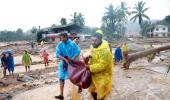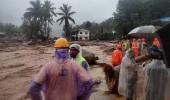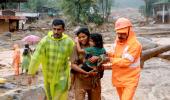Scientists and experts on Tuesday called for a landslide prediction mechanism and construction of safe structures for the vulnerable population after about 100 people were killed in a series of landslides in Kerala.

Madhavan Rajeevan, former secretary of the Union earth sciences ministry, said weather agencies can predict extremely heavy rainfall events, but whether that would trigger a landslide cannot be said with certainty.
"Heavy rainfall does not lead to landslides every time. We need a separate mechanism for landslide prediction. It is difficult but doable," Rajeevan told PTI.
The conditions that lead to landslides, including soil texture, soil moisture and slope are known, and it is important to put all this knowledge into an operational system, he said.
"Unfortunately, we have not done that yet."
"When a river is in spate, we shift people to safer places. We can do the same thing if there is heavy and continuous rainfall. We have good science and good capability; we just have to convert that into practice," Rajeevan said.
Sreekumar, a disaster risk management expert at the Kerala Institute of Local Administration, told PTI that rainfall above 120 mm for two to three days is enough to trigger landslides in the fragile terrain of the southern coastal state.
"There are many landslide-prone areas in Wayanad. The only thing we can do is move people to safer areas. The authorities should build monsoon houses for people living in such areas," Sreekumar said.
Significant landslides have occurred in and around this area in the last three decades.
In August 2019, 17 people died after a landslide hit Puthumala in Wayanad, around 10 km from the areas currently affected. Chembramala, the highest peak in the Wayanad hills, and Kartikulam, a small town in the district, saw multiple landslides in 2012 and 1992, respectively.
Roxy Mathew Koll, a climate scientist at the Indian Institute of Tropical Meteorology, said around half of Kerala comprises hills and mountainous regions where the slope is more than 20 degrees, making these places prone to landslides when heavy rains occur.
"Landslide-prone areas are mapped and available for Kerala. Panchayats with hazardous areas should be identified and sensitized. We need to monitor rainfall data in these hotspots and prepare early warning systems targeted at hazard-prone areas," he said.
This is possible with the current technology and know-how and can save lives and livelihoods, Koll said.
The scientist said there is a need to evaluate the land use changes and development activities happening in landslide-prone areas.
Often, landslides and flash floods occur in regions where the impact of both climate change and direct human intervention in terms of land use changes are evident.
At the same time, there have been many severe landslides in regions with minimal land use changes as well, he said.











 © 2025 Rediff.com -
© 2025 Rediff.com -